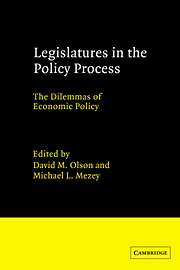Book contents
- Frontmatter
- Contents
- List of contributors
- Preface
- Acknowledgments
- PART I INTRODUCTION
- PART II MACROECONOMIC POLICY
- PART III MICROECONOMIC POLICY
- 5 The British House of Commons and industrial policy
- 6 Congress and the development of a computer industry policy in Brazil
- 7 Electronics policy and the Indian parliament
- 8 The Polish parliament and labor legislation during Solidarity
- PART IV CONCLUSION
- Name index
- General index
6 - Congress and the development of a computer industry policy in Brazil
Published online by Cambridge University Press: 03 March 2010
- Frontmatter
- Contents
- List of contributors
- Preface
- Acknowledgments
- PART I INTRODUCTION
- PART II MACROECONOMIC POLICY
- PART III MICROECONOMIC POLICY
- 5 The British House of Commons and industrial policy
- 6 Congress and the development of a computer industry policy in Brazil
- 7 Electronics policy and the Indian parliament
- 8 The Polish parliament and labor legislation during Solidarity
- PART IV CONCLUSION
- Name index
- General index
Summary
Of the many challenges facing legislature in contemporary societies, that of effectively participating in initiating and shaping industrial development policy is perhaps the most critical. Traditionally, legislatures were suited to perform a number of important functions, such as representation, legitimization, socialization of political leadership, and communication between government and constituencies and vice versa. However, the challenge of advanced industrialization and the harnessing of science and technology to formulate industrial policies caught many legislatures unprepared even in the most developed society with a strong legislative system such as the United States of America. To effectively participate in shaping industrial policies legislatures needed to equip themselves with staff and information capabilities, previously unavailable to them. They also found that the decentralized structure that facilitated their traditional functions was ill-suited to the function of long-range planning and integration of science and technology into public policy. Yet legislatures do play an important role in shaping industrial policy, even when their function has been drastically curtailed as is the case with the Brazilian Congress, under the military dominated regime (1964–85).
This chapter explores the role the Congress played in shaping a very important aspect of Brazil's industrial policy, that of the manufactur and use of computers, semi and superconductors, integrated circuit, and the necessary software that goes with it, known in Brazil as the policy of “informatics”. It is not our intention to evaluate the economic wisdom of congressional intervention as compared to executive proposals and plans.
- Type
- Chapter
- Information
- Legislatures in the Policy ProcessThe Dilemmas of Economic Policy, pp. 130 - 159Publisher: Cambridge University PressPrint publication year: 1991

